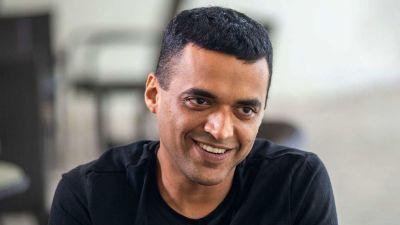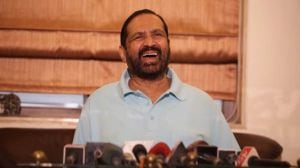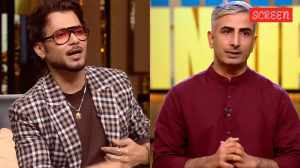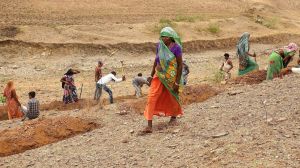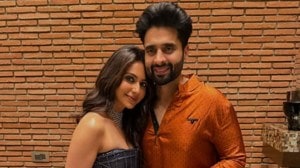I want to put all pathies on par with each other: Dongaonkar
AURANGABAD, July 26: With the bickering over the new Medical and Health Sciences University MHSU having quietened, the focus has shifte...

AURANGABAD, July 26: With the bickering over the new Medical and Health Sciences University MHSU having quietened, the focus has shifted to the real issues the institution plans to address. The newly appointed vice-chancellor, D G Dongaonkar, says the path to building the health of the country8217;s third largest state is by adopting a holistic approach, which blends the best of ayurveda, allopathy, homoeopathy, and unani.
Doctors will be trained in indigenous research and weaned away from the preoccupation with western concepts of medicine.
While fine-tuning his plans, Dongaonkar has been meeting experts from all over the state. He visited the Government Medical College and Hospital here, from where he graduated in 1972.
Originally from Udgir in Latur district, the 49-year-old former dean of Mumbai8217;s JJ hospital is interested in yoga and has been conducting research in the field for the last seven years. He spoke to The Indian Express about the objectives of the new universityheadquartered at Nashik, which will administer the state8217;s 170 medical colleges. Excerpts from an interview:
Is it feasible to set up such a university when decentralisation is increasingly being looked upon as the answer to good administration?
A common university is indeed desirous for a professional course. We are only a small minority and often get neglected in the larger world of general education. Moreover, our National Education Policy 1986, and the Medical Council of India recommend that the states strive to have a medical university. We are only the fourth state to have such a university. Punjab will soon follow.
What are the university8217;s objectives?
The focus will be on the patient. This might not seem very obvious. But when you consider that good patient care can be offered only by good doctors, and that good doctors can be made only when they are provided with quality education, our basic aim can be understood.
Facilities at medical colleges and hospitals state-widediffer vastly. How can a common standard be achieved?
We shall strive towards a uniform standardisation of teaching and infrastructural facilities at all places. Colleges in Marathwada and Vidarba are still very poorly equipped and something needs to be done immediately on this account. My intention is to ensure that all students enjoy equal privileges.
The staff position at most colleges is matter of concern. Are there any moves to improve this?
There cannot be a programme specially to focus on this. After all, it is a matter of individual choice. And the recommendations of the Fifth Pay Commission are quite attractive to lure the best in the profession. I also have no plans to change the appointment procedure for lecturers/professors. It can be handled by the State Government as done currently.
What type of administrative set-up will the university have?
For the first year, all members of the Management Council, Academic Council, Board of Studies, and Board of Examinations willhave government nominated members. Almost 95 to 96 per cent of these members will be from the medical profession.
What about the appointment of registrars and deputy registrars?
Administrative posts need not necessarily be filled with persons with a medical background. I have kept my options open for the post of registrar. Otherwise, the choice will get limited to a narrow spectrum. But doctors themselves will not be too eager to take up responsibilities which are exclusively administrative in nature. However, in the Examination Department, I want to have people from the medical profession.
Doctors from other fields of medicine fear they will be neglected.
The fact that a man from allopathy leads the university will naturally create fear in the minds of doctors from ayurved, unani and homoeopathy. But they should entertain no such doubts. In fact, one of the mega-projects I have in my mind is to put all the quot;pathiesquot; on par with each other.There will be an active intra-pathycollaboration with the university in matters of research and study. I am working on a plan where students of allopathy, ayurved, unani and homoeopathy will get to study the best from each others8217; courses. Of course, these will be short-term additional/optional subjects and the duration and course contents are yet to be decided.
How will this benefit students?
There are no clear cures for many diseases like allergies and ashthma in allopathy. We have to seek the help of ayurved to treat them. So why not let the students study it during their course?
What about research?
At present, we follow a system which is highly dominated by Western concepts of healthcare and it does not bode well for the health of the country. Western concepts are actually devoid of any strong philosophy. Have you ever heard of anything like day-to-day healthcare in the West? We have one for ourselves 8212; called Auurygyamaya deena deena health care day-to-day.We also have our own problems, which are differentfrom those in the West. For example, the plague in Surat and Beed needed an indigenous handling and we failed because we did not have enough research on it of our own.
What kind of financial aid does the new university have?
At present, we shall have to depend on government aid. But I plan to create the university8217;s own sources of income. For instance, it could run entrepreneurial projects. Philanthropists will also be willing to help set up some. We already have an offer from the University of Florida, which wants to set up a hospital where professionals can undertake tailor- made courses in hospital management, and other related aspects.
Students fear that the creation of the university will lead to problems of administration.
The university will be headquartered at Nashik, but apart from policy matters other decisions can be taken at the regional centres which will be set up in each university area. These centres will be connected by the most modern electronic systems includinge-mail.
Do you want to bring about any changes in the existing examination system?
Yes indeed. The multiple choice system has proved the best way to judge a student8217;s calibre. It also helps check exam malpractices besides forcing students to adapt to a vigourous method of study. If possible, I may also introduce computer-aided evaluation of answer papers.
Also, students should not be allowed to take the practical exams till they clear their theory papers. It may not be possible to implement all this right away but I am seeking a consensus on it.
- 01
- 02
- 03
- 04
- 05


